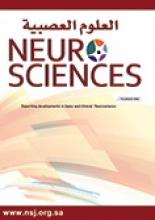Abstract
OBJECTIVE: To investigate the effect of estrogen exerted through the autonomic system in the nucleus tractus solitarii (NTS) on increasing the sensitivity of the baroreflex under conditions of acute hypertension in ovariectomized rats.
METHODS: In this experimental study, conducted in Kerman University of Medical Sciences, Kerman, Iran from March 2010 to October 2010, 36 female rats were ovariectomized and then estrogen capsules were implanted beneath their skin. After 2 weeks, the left femoral vein and artery were cannulated for phenylephrine infusion and recording of mean arterial pressure and heart rate. Subsequently, atropine, propranolol, and saline were injected into the NTS, followed by measurements of changes in heart rate and changes in mean arterial pressure just prior to phenylephrine infusion.
RESULTS: Estrogen increased the bradycardia response and inhibited the rise of mean arterial pressure; namely, after phenylephrine infusion, the change in heart rate was significantly lower in the estrogen-receiving group compared with the control group (p<0.05). Baroreflex sensitivity was significantly increased in the estrogen-receiving group compared with the control group (p<0.01). Baroreflex sensitivity was significantly attenuated in both groups (estrogen-receiving and control) after atropine injection, compared with after propranolol or saline injection (p<0.01).
CONCLUSION: It is probable that under conditions of acute hypertension, estrogen affects the NTS through the parasympathetic system and enhances baroreflex sensitivity.
- Copyright: © Neurosciences
Neurosciences is an Open Access journal and articles published are distributed under the terms of the Creative Commons Attribution-NonCommercial License (CC BY-NC). Readers may copy, distribute, and display the work for non-commercial purposes with the proper citation of the original work.






